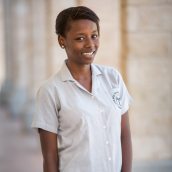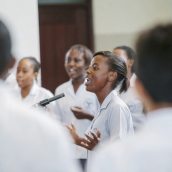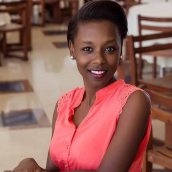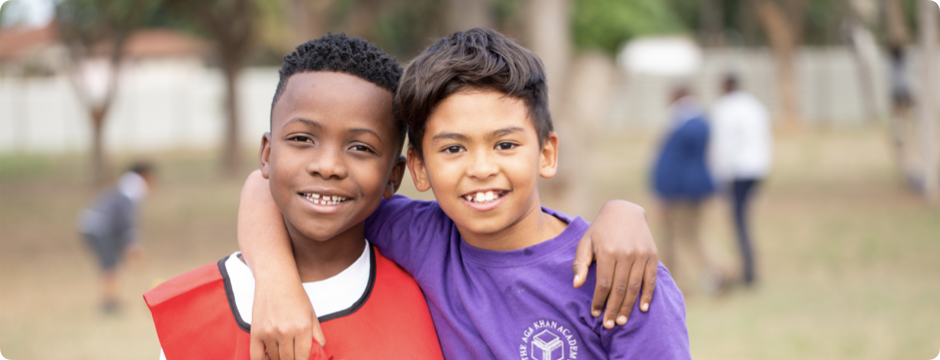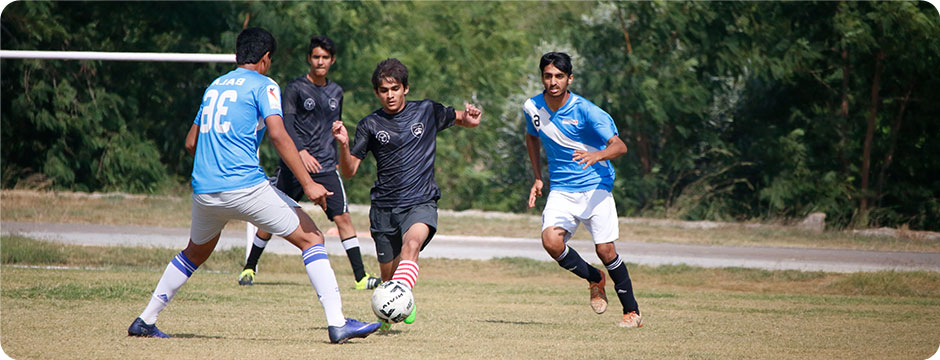Director of Academies Salim Bhatia's welcoming remarks to the 2017 graduating classes at the Aga Khan Academies in both Hyderabad and Mombasa.
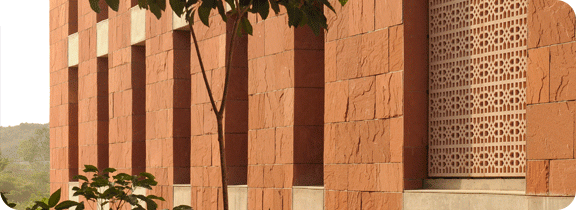
Quick Facts About the Academy
The Aga Khan Academy Hyderabad (established 2011)
Location: South of the city of Hyderabad, near the Rajiv Gandhi International Airport
Campus size: 100 acres of land allocated by the state government
Campus design and construction:
- total built area: approximately 500,000 square feet
- master facilities planners for the Academies: Sasaki Associates Inc. of Boston, USA
- campus design: award-winning architect Bimal Patel of HCP in Ahmedabad, India
- campus construction: Shahpoorji Pallonji
Curriculum
The Aga Khan Academy Hyderabad is an International Baccalaureate (IB) World School
IB programmes:
- Primary Years Programme: grades 1–5;
- Middle Years Programme: grades 6–10;
- Diploma Programme: grades 11–12
Aga Khan Curricular Strands, implemented across the curriculum:
Ethics, Pluralism, Cultures (with an emphasis on Muslim civlisations), Governance and Civil Society, and Economics for Development
Staff and students
Faculty numbers: 8 senior management, 63 Senior School faculty, 19 Junior School faculty, 7 working in both Senior & Junior Schools, 42 administrative staff
Number of students currently enrolled: 632 day and residential students in total: 140 day students in the Junior School; 492 students in the Senior School, with 245 in residence
Numbers of students and teachers at full capacity: 750 students and 90 teachers, with over 40% of students receiving some form of financial aid
First IB Diploma Programme graduating class: 2014
Residential students
Number of residential students: 245 currently, with full capacity of 300 students
Number of students per room: Between 2 and 4, with second year Diploma Programme students in single/double rooms
Residential facilities: Student lounge with multimedia and entertainment equipment, study areas, laundry facilities, dining hall
Campus facilities
Sports facilities: 25-metre swimming pool, diving pool, gym, two regulation-sized basketball courts, three cricket pitches with net practice facilities, two tennis courts, four squash courts, athletics track, junior play area, hockey field, training field, 2.5 km cross-country track
Arts facilities: Rooms for fine arts, music, dance; individual music practice booths; music recording area; amphitheatre performance space
Academic areas: Junior School classrooms, Senior School classrooms, science and computer laboratories, library and resource centre, arts facilities, music and dance studios
Residential buildings: 6 residential blocks: 3 male and 3 female; 6 dorm parent apartments in each block. Each block has a central atrium, lounge area, patio and laundry facilities.
Health and Wellness Centre: 12 beds and a full-time, qualified nurse
Professional Development Centre
The Aga Khan Academy Hyderabad is home to a Professional Development Centre for the advancement of teachers. The primary objective of this centre is to provide professional development that will benefit the wider school system in India.
Programming began in June 2010 with a Professional Learning for Educators Series for teachers in local government, independent and not-for profit schools.
The Aga Khan Academies network
18 Academies are planned in Africa, South and Central Asia, and the Middle East.
3 Academies are currently operating: Mombasa, Kenya (opened 2003); Hyderabad, India (opened 2011); and Maputo, Mozambique (opened 2013).
When complete, the network will represent 2,000 teachers and 14,000 students (boys and girls), with 1,400 graduates annually.
Institutional partnerships include:
Agencies of the Aga Khan Development Network; the International Baccalaureate, universities including the University of British Columbia, Concordia University, Ryerson University, University of California - Los Angeles, California State University - Northridge
Government partnerships include:
The Province of Ontario, Canada; the Ministry of Education, Science and Technology, Kenya; the Ministry of Education and Human Development, Mozambique; the French Development Agency (AFD); the French Mozambican Cultural Centre (CCFM - Centro Cultural Franco-Mozambicano); the Department of School Education, Telangana, India
Download the Quick Facts sheet here. ![]() AKA-Hyderabad-Quick-Facts.pdf
AKA-Hyderabad-Quick-Facts.pdf
The Aga Khan Academies reach out to educators in Canada
Mary Favour (Class of 2015): Ambitions to build a better future
For a while, getting an education was a process for Mary Favour. She would rise early in the dark – at 4:00 am – and make the long trek to school on foot with her three siblings, arriving at around 6:30 am each day. By the time they returned home to Mombasa, it was 7:00 pm. The rest of the evening was spent helping their mother around the house and finishing their homework.
It wasn’t easy, Mary recalled.
“My sisters and I grew up with a single mother,” she said. And resources were tight.
When the electricity bill wasn’t paid, the Favour children would study under the dim glow of a kerosene lamp or by candlelight. The four siblings had limited school supplies and relied on Mary for many of their study materials.
“We got awarded books if we topped the class,” she explained. “Sometimes we’d get textbooks, other times we’d get storybooks or novels. It was an incentive that the teachers had to motivate students.”
A new opportunity at the Aga Khan Academy Mombasa
Despite the obstacles, Mary said her mother was determined for her to succeed. She pooled her resources to give Mary a much-needed laptop in grade 9. By then, things had begun to turn around – Mary had received a full scholarship to study and live at the Aga Khan Academy Mombasa as part of its Talent Identification Programme, a programme that provides students from more disadvantaged backgrounds the opportunity to attend the Academy on full scholarship. She would graduate in 2015 and go on to study at the University of Toronto in Canada, also on full scholarship.
Now a second-year student at university, Mary hasn’t forgotten her difficult upbringing or her roots. In fact, the struggle to get an education early on has instilled in her a strong desire to give back to her community and help others like her get a shot at a better life.
“Six years of growth, skill and a good education” at the Academy was “a gift,” Mary said. “I want to [give] a gift to someone else.”
In particular, she’s learned the importance of independence, humility and sacrifice – lessons she put to use during her Academy days.
Mary joined the Aga Khan Academy in 2009 as part of the first batch of students in the Talent Identification Programme. While there, she participated in a range of activities, including choir, soccer and debate, with the same level of perseverance her mother had taught her. She quickly excelled academically, becoming an honors student in grade 10, and also challenged herself in extracurriculars – musically in competitions and as the assistant captain of her hockey team.
Helping others through community service
Beyond this, Mary fostered a passion for community service and activism rooted in her desire to help outsiders fit in. She led the ‘Just Say No’ initiative, a programme focused on rehabilitating primary school girls in Mombasa who had turned to prostitution in large part to support their families financially.
She worked with these girls for three years, exposing them to the same opportunities she and other students had the privilege of in their own education, including sports and debate. She hosted workshops on public speaking and art, as well as sessions with counsellors and strong female mentors, and invited the girls to perform at the Academy’s talent competition.
“The aim was to help them feel integrated into society but at the same time equip them with skills that would make their education holistic,” Mary said. The mission was especially important, she said, because of the gender gap she saw in Mombasa’s primary schools and the way in which this unfair system contributed to larger problems down the line.
“That inequality creates an imbalance that marginalizes women in our society,” Mary said.
Under her leadership, the club received three awards and became one of the most successful student groups on campus.
Supporting other students to succeed
In addition, Mary founded the ‘I Know Who I Am’ initiative, a programme that integrates scholarship students like herself into the Academy community while understanding that they needed to “stay in touch with home and not forget their society,” as Mary explained.
“I wanted to celebrate the diversity that came with these students but at the same time make sure that they don’t lose themselves,” she said. So she ran workshops on pluralism and open-mindedness, ate food and played games the students would recognise from home and “held discussions on what it meant to be part of a community but remain true to yourself.”
In the summer of 2017, Mary interned with the Students for International Development. The non-profit organisation was founded and is run by students. While there, she worked with the Orphan Sponsorship Programme as project manager for about two months. Mary and her team focused on the Simboyi Primary School in Vihiga, in the west of Kenya. They were in charge of the remedial education project for orphans and also worked on projects to support students financially.
After conducting interviews with some of the students in Vihiga, Mary and her team developed a means by which to help them be better equipped to reach their full potential. According to Mary, a number of the students came from families that were struggling to make ends meet. Some, she recalled, told her they only had one meal per day, which usually consisted of just ugali or porridge. Others said they didn’t eat at all. Further, a number of those who performed well in class were unable to pay for their exams and had to sit them out instead.
With Mary’s help, the organisation created a scholarship to help these students. The award, which she said covers basic health care, one meal a day, a yearly uniform and exam fees, will be able to assist 55 students during the current academic year at Simboyi. The hope is that the sponsorships will continue into the next year if budget and fundraising allow.
Real-time results and change like this mean the world for Mary, not least because she knows firsthand what it’s like to have the academic situation and resources not in your favour.
“I was a child with big dreams and no way of actualising them until I joined the Academy,“ she said. “I want to be for someone else what the Academy was to me.”
Catalyzing change for a better future
Mary believes education is one of the best tools to rid our societies of poverty, and she’s determined to be in a position to support students so they have better paths forward at their disposal than what she had. That’s why she plans on returning to Kenya after she’s obtained the necessary experience and skillset to properly give back to her country and community.
Currently majoring in human geography and diaspora and transnational studies and minoring in African studies, Mary thinks that, through the study of cultures and international development, she can better understand how to bridge the gap between rich and poor at home. Her hope is to protect the rich cultural diversity of Kenya but also contribute to changing the country so that it is better able to develop and sustain itself and compete and interact on a global scale more effectively.
“Kenya is at such a pivotal moment in the making of African history,” she said. “It has so much potential. I just want her to maximize her potential. I want to help her do it.”
Mary is uniquely positioned to kickstart such a change at home. Her pluralistic perspective on the world and passion for country could be just what Kenyans need to motivate their leaders to be better and to take action to institute real change. And if her triumphs at the Academy are any indication, Mary’s motivation may just be contagious.
By Farah Mohamed
Titus Mutemi: A transformative educator
In 2015, Titus Mutemi joined the Aga Khan Academy Mombasa as part of the Teacher Preparation Programme (TPP), which aims to train teachers to become transformative International Baccalaureate educators in their communities. This became a turning point for Titus' career as he has since further developed his extensive knowledge and skills and forged a pluralistic view of the world.
For Titus, the priority has always been to ensure that students have the best learning experience. As a result, he reviewed and vertically aligned the mathematics programme to ensure that there were no existing gaps between mathematics knowledge, concepts and skills across all the grade levels in his role as a Homeroom teacher. This step brought about a significant improvement in the students' performance of the subject.
Titus’ proudest moment at the Academy was to see the students he taught from Year 1 successfully complete their Primary Years Programme (PYP) Exhibition. “It was my pride to see them demonstrate their understanding of the world around them; to make more informed choices and confidently express themselves. In their projects, they engaged in discussing issues that require deeper and critical thinking skills, in the effort to make the world a better place.”
As the new PYP Coordinator, Titus looks forward to collaborating with the teachers to continue to develop effective teaching practices, which will give students the best learning experiences. He also plans to continue supporting students to help them realise their full potential.
Expressing her pride and excitement for Titus, Junior School Principal Annia Dear said, “Titus has come into his new role in an exciting, albeit challenging time, but has without hesitation accepted and moved forward with all that his role demands. His knowledge and understanding of the needs of students and teachers at this crucial time has been invaluable. His calm nature, positive attitude and commitment to achieving ongoing success with students, parents and teachers is an asset.”
Having been a part of the Academy for over five years now, Titus appreciates being part of a supportive community that is united by a common mission and vision to develop the leaders of tomorrow. As he expresses, “There is no greater joy than nurturing young learners and witnessing them grow into more responsible, reflective and increasingly independent individuals.”
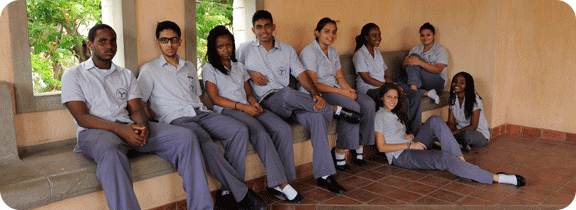
Quick Facts about the Academy
The Aga Khan Academy Mombasa (established 2003)
Location: Kizingo area of Mombasa Island
Campus size: 18 acres of land; campus design inspired by local Swahili architecture
Curriculum
The Aga Khan Academy Mombasa is an International Baccalaureate (IB) World School
IB programmes:
- Primary Years Programme: years 1–5
- Middle Years Programme: years 6–10
- Diploma Programme: years 11–12
Aga Khan Curricular Strands, implemented across the curriculum:
Ethics, Pluralism, Cultures (with an emphasis on Muslim civilisations), Governance and Civil Society, and Economics for Development
Staff and students
Faculty numbers: 7 senior management, 70 Senior School faculty, 27 Junior School faculty, 104 administrative staff
Number of students currently enrolled: 687 day and residential students in total: 181 day students in the Junior School; 506 day and residential students in the Senior School, with 270 in residence
Numbers of students and teachers at full capacity: 750 students and 90 teachers, with over 30% of students receiving some form of financial aid
First IB Diploma Programme graduating class: 2007
Residential students
Number of residential students: 270 currently, with full capacity of 300 students
Number of students per room: Between 1 and 4, with second year Diploma Programme students in single or double rooms
Residential facilities: Student lounge with large-screen television, study areas, laundry facilities, dining hall
Campus facilities
Sports facilities: 25-metre swimming pool, diving pool, full-sized sport field, Astroturf field, gym,
three regulation-sized basketball courts, cricket pitch, tennis courts, squash courts, badminton court, volleyball court, netball court and junior play area
Arts facilities: Rooms for fine arts, music, dance; individual music practice booths; music recording area; amphitheatre performance space
Academic areas: Junior School classrooms, Senior School classrooms, science and computer laboratories, multiple-award-winning library and resource centre, arts facilities, music and dance studios
Residential buildings: Six residential blocks: three male and three female; 4–6 dorm parent apartments in each block. Each block has a central atrium, lounge area, ocean view, patio and laundry facilities
Technology: The Aga Khan Academy Mombasa has been named a Microsoft Showcase School, the only school in East Africa to receive this designation
Professional Development Centre
The Aga Khan Academy Mombasa is home to a Professional Development Centre for the advancement of teachers. The primary objective of this centre is to provide professional development that will benefit the wider school system in Kenya.
Programming began in June 2010 with a Professional Learning for Educators Series for teachers in local government, independent and not-for profit schools.
Through the Microsoft Showcase Schools programme, the Aga Khan Academy Mombasa shares ideas globally and supports other schools in Kenya to improve learning and student outcomes through technology.
The Aga Khan Academies network
18 Academies are planned in South and Central Asia, Africa and the Middle East.
3 Academies are currently operating: Mombasa, Kenya (opened 2003); Hyderabad, India (opened 2011); and Maputo, Mozambique (opened 2013).
When complete, the network will represent 2,000 teachers and 14,000 students (boys and girls), with 1,400 graduates annually.
Institutional partnerships include:
Agencies of the Aga Khan Development Network; universities including Harvard, Oxford, Toronto and University of California, Los Angeles; secondary schools including Phillips Academy, Andover, USA and Schule Schloss Salem, Germany.
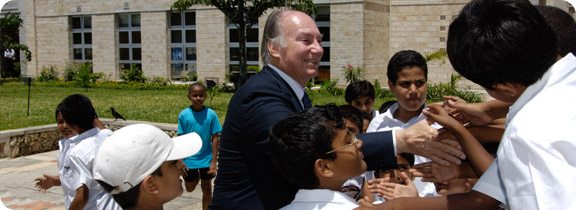
Speeches
Keynote address by Her Excellency Margaret Kenyatta, First Lady of the Republic of Kenya, at the 10th graduation ceremony of the Aga Khan Academy Mombasa
Speech by Salim Bhatia, Director of Academies, at the 10th graduation ceremony of the Aga Khan Academy Mombasa
Graduating student Joshua Ekirikubinza's speech, given on behalf of the Aga Khan Academy Mombasa's Class of 2015
Welcome address by Director of Academies Salim Bhatia at the AKA Hyderabad and AKA Mombasa 2015 graduation ceremonies (conducted simultaneously)
Keynote speech by Dr Matt Reed, CEO AKF India at the 2015 graduation ceremony in Hyderabad
Welcome address by Salim Bhatia, Director of the Aga Khan Academies network, at the inauguration of the Aga Khan Academy Hyderabad
Speech by His Highness the Aga Khan at the inauguration ceremony of the Aga Khan Academy Hyderabad
Speech by Director of Academies, Salim Bhatia, at the graduation ceremony at the Aga Khan Academy Mombasa
Keynote speech by Mr Jan Mohamed at the graduation ceremony at the Aga Khan Academy Mombasa
Remarks by His Highness the Aga Khan at the Academy of Sciences in Lisbon
Speech by His Highness the Aga Khan at the foundation stone-laying ceremony of the Aga Khan Academy Dhaka
Salim Bhatia's welcoming remarks at the foundation stone-laying ceremony of the Aga Khan Academy Dhaka
Speech by Dr Hossain Zillur Rahman at the foundation stone-laying ceremony of the Aga Khan Academy Dhaka
Welcome address by Salim Bhatia at the foundation stone-laying ceremony of the Aga Khan Academy Kampala
Speech by H.E. Yoweri Kaguta Museveni at the foundation stone-laying ceremony of the Aga Khan Academy Kampala
Remarks by His Highness the Aga Khan at the foundation stone-laying ceremony of the Aga Khan Academy Kampala
Salim Bhatia's welcoming remarks at the residential campus foundation stone-laying ceremony, Aga Khan Academy Mombasa
Remarks by His Highness the Aga Khan at the foundation stone-laying ceremony of the residential campus, Aga Khan Academy Mombasa
Speech by the Chief Minister at the foundation-stone laying ceremony of the Aga Khan Academy Hyderabad
Opening remarks by Salim Bhatia at the foundation stone-laying ceremony of the Aga Khan Academy Hyderabad
Remarks by His Highness the Aga Khan at the foundation stone-laying ceremony of the Aga Khan Academy Hyderabad
Remarks by His Highness the Aga Khan at the groundbreaking ceremony of the International Academic Centre of Excellence, Dar es Salaam


